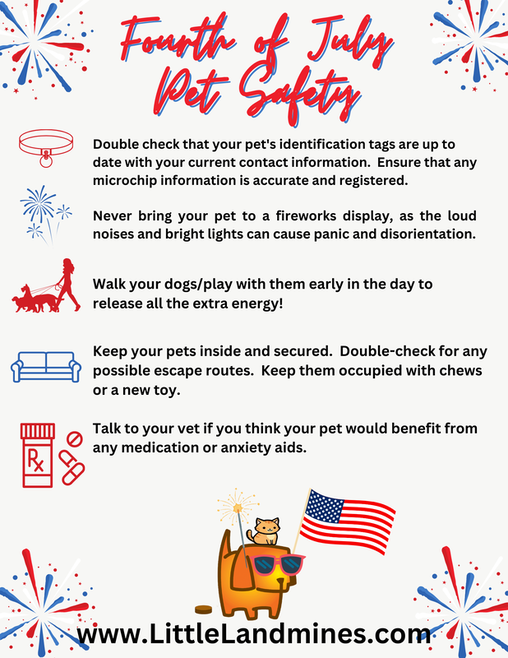 As we prepare to celebrate the Fourth of July, it's important to remember that the festivities can be overwhelming and potentially hazardous for our beloved pets. Little Landmines Pet Waste Removal is committed to the well-being of our furry companions, so we've put together this blog post to highlight essential tips for keeping your pets safe and stress-free during the Independence Day celebrations. Let's ensure that this holiday is enjoyable for both you and your four-legged family members!
At Little Landmines Pet Waste Removal, we wish you a safe and enjoyable Fourth of July celebration! If you need any assistance with pet waste removal or have any pet-related concerns, feel free to reach out to us. Happy Fourth of July!
0 Comments
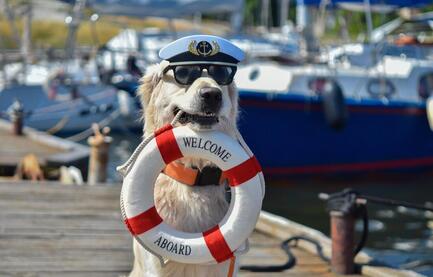 Ahoy, dog lovers! With the summer season in full swing, many pet parents are eager to hit the open waters and enjoy some quality time on their boats. But before you set sail with your furry companion, it's crucial to prioritize their safety and well-being. At Little Landmines Pet Waste Removal, we care deeply about our four-legged friends, which is why we've put together this blog post to guide you through essential boating safety tips for dogs. So grab your life jackets and read on to ensure a splashing good time for everyone. 1. Life Jackets: A Must-Have: Just as humans need life jackets, so do our canine companions. Even if your furry friend is a strong swimmer, unexpected circumstances like strong currents or exhaustion can pose a threat. Invest in a high-quality, properly fitted dog life jacket that provides buoyancy and visibility. Getting your pooch accustomed to wearing it before you embark on your boating adventure is also crucial. 2. Paws Off the Edge: Dogs are naturally curious creatures, and the open expanse of water may tempt them to stick their heads, paws, or entire bodies over the boat's edge. To prevent accidents, ensure your boat has protective railings or barriers that prevent your dog from falling or jumping overboard. Always keep a watchful eye on them and discourage any risky behavior near the boat's edges. 3. Sun Safety: Remember, dogs can get sunburned too! Canines with thin fur or light-colored coats are especially susceptible to sunburn and heatstroke. Apply pet-safe sunscreen to areas vulnerable to sun exposure, such as the nose, ears, and belly. Provide shade on the boat with an umbrella or a specially designed dog-friendly canopy, and always keep fresh water available to keep your furry friend hydrated. 4. Smooth Sailing: Motion Sickness and Anxiety: Just like some humans, dogs may experience motion sickness or anxiety while on a boat. Familiarize your pup with the boat by allowing them to explore it while docked. Gradually introduce short trips to help them acclimate to the rocking motion. Consult with your veterinarian about potential motion sickness remedies or anti-anxiety solutions if your dog struggles with these issues. 5. Pawtection from Heat and Elements: Boat decks can become scorching hot under the sun, which can cause burns or discomfort to your dog's sensitive paws. Provide a cool surface for your pup by placing mats or towels on the deck. Additionally, keep their paws safe from sharp objects or debris by ensuring the boat is clean and free from hazards that may cause injury. 6. Water, Water Everywhere: While it may be tempting to let your dog drink directly from the river, lake, or ocean, it's important to discourage them from doing so. Contaminated water sources can lead to gastrointestinal issues or infections. Always carry fresh water and a portable bowl on the boat to keep your furry friend well-hydrated. Boating with your furry friend can be a fantastic adventure, creating memories that will last a lifetime. By following these essential boating safety tips, you can ensure a safe and enjoyable experience for both you and your dog. At Little Landmines Pet Waste Removal, we believe that responsible pet ownership extends to all aspects of life, including recreational activities. So, grab your life jackets, be prepared, and have a wag-tastic time exploring the open waters with your canine companion! 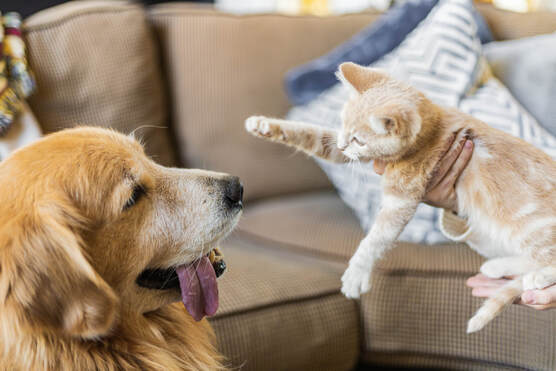 Bringing a new pet into your home can be an exciting and joyous experience. However, introducing a new pet to your existing dog or cat requires careful planning and consideration. At Little Landmines Pet Waste Removal, we understand the importance of a harmonious pet household. In this blog post, we will guide you through the process of introducing a new pet to your dog or cat, ensuring a smooth transition and a happy coexistence.
Introducing a new pet to your existing dog or cat requires patience, careful planning, and a gradual approach. At Little Landmines Pet Waste Removal, we believe that a harmonious pet household is essential for the well-being of all pets involved. By following these guidelines and providing a supportive environment, you can help foster a positive relationship between your pets and create a happy, coexisting family dynamic. Remember, each pet is unique, and the introduction process may vary depending on individual personalities and circumstances. Seek guidance from a professional if you encounter any persistent issues or concerns during the introduction. With proper preparation and a commitment to your pets' well-being, you can create a loving and peaceful home for all your furry friends. 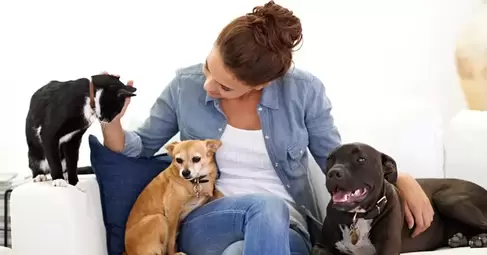 As the temperatures rise and summer vacations beckon, it's time for pet owners to plan their trips and ensure their furry friends are well taken care of. At Little Landmines Pet Waste Removal, we understand that not every adventure can include our beloved pets. That's why we're here to help guide you through the process of finding a trustworthy and capable petsitter. By following our tips, you can enjoy a worry-free vacation, knowing your furry companions are in good hands. Seek Recommendations: When searching for a petsitter, start by seeking recommendations from friends, family, and fellow pet owners. Personal referrals can provide valuable insights into the reliability and quality of care offered by a potential petsitter. Additionally, consider joining local pet communities or online forums where pet owners share their experiences and recommendations. Meet and Greet: Once you have a shortlist of potential petsitters, arrange a meeting to evaluate their suitability. This meeting serves as an opportunity for your pet to interact with the sitter and gauge their compatibility. Observe how the petsitter engages with your furry friend and assess their level of comfort and expertise. Ask questions about their experience, availability, and any specialized skills they may possess. Verify Credentials: When entrusting your pet's well-being to someone else, it's essential to verify their credentials. Ensure the petsitter has the necessary knowledge and skills to handle emergencies and provide the care your pet requires. Ask about their experience with different breeds, any relevant certifications or training, and their familiarity with administering medications if needed. Check References: Ask the prospective petsitter for references from previous clients. Speaking to these references will give you a clearer picture of the petsitter's reliability, professionalism, and the level of care they provide. Inquire about their punctuality, communication skills, and any concerns that may have arisen during their engagement. Assess Home Environment: If the petsitter offers in-home pet care services, it's crucial to assess the environment where your pet will be staying. Ensure that the home is safe and secure, free from hazards, and suitable for your pet's needs. Consider factors such as space, cleanliness, the presence of other animals, and the availability of outdoor areas for exercise. Communication and Updates: Staying connected with your petsitter during your vacation will provide peace of mind. Discuss your expectations regarding communication and ask how frequently they will update you on your pet's well-being. Trustworthy petsitters will understand the importance of maintaining contact and promptly addressing any concerns or emergencies. Emergency Preparedness: Inquire about the petsitter's emergency preparedness plan. They should have a clear understanding of what to do in case of illness, injury, or any other unexpected situation. Ask if they have access to a reliable veterinarian or if they are trained in basic pet first aid. Finding the right petsitter is crucial to ensure your furry friend's safety, happiness, and well-being while you're away. Little Landmines Pet Waste Removal believes that with the right guidance and a careful selection process, pet owners can enjoy their summer vacations, confident that their pets are receiving the care they deserve. Remember to seek recommendations, arrange meet and greets, verify credentials, check references, assess the home environment, prioritize communication, and ensure the petsitter is prepared for emergencies. With these considerations in mind, you'll be able to find a reliable and trustworthy petsitter who will make your pet's summer as enjoyable as yours. Happy travels! 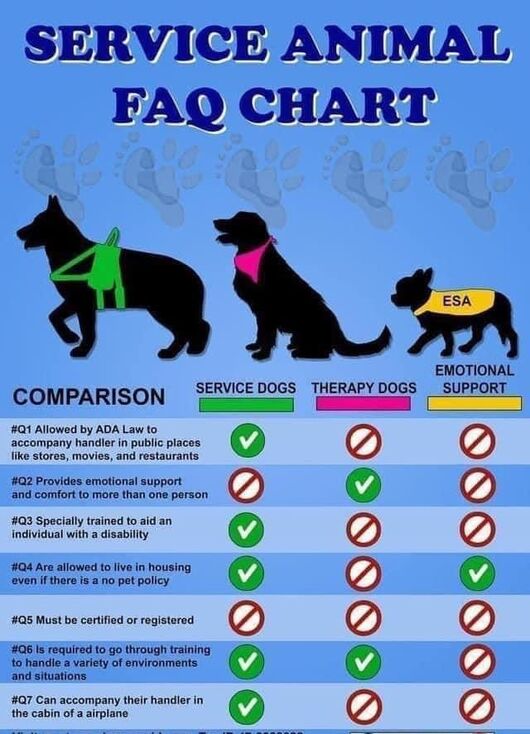 At Little Landmines Pet Waste Removal, we often encounter all types of pets, including working dogs and therapy dogs. What is the distinctions between service dogs, therapy dogs, and emotional support dogs? These three categories play vital roles in providing assistance, comfort, and support to individuals with different needs. In this blog post, we aim to clarify the unique roles of each type of dog and highlight the valuable contributions they make to society. Service Dogs: A Helping Paw in Action: Service dogs are highly trained canines that assist individuals with disabilities by performing specific tasks. These incredible companions are trained to aid people with mobility impairments, guide individuals with visual impairments, alert those with hearing impairments, or even detect seizures and diabetic emergencies. Service dogs undergo extensive training to develop the skills necessary to assist their handlers effectively. Under the Americans with Disabilities Act (ADA), service dogs have full access rights and are allowed to accompany their handlers in public places. This legislation ensures that individuals with disabilities can rely on the support and assistance provided by their service dogs, enhancing their independence and quality of life. Therapy Dogs: Bringing Comfort and Joy Therapy dogs, unlike service dogs, are trained to provide comfort, affection, and emotional support to individuals in various settings. These remarkable canines work in hospitals, nursing homes, schools, and disaster areas, among other controlled environments. Their primary purpose is to bring joy and therapeutic benefits to those in need. Therapy dogs undergo specialized training and certification to ensure they are well-behaved, adaptable, and able to handle different situations. They work under the supervision of their handlers or owners and play a significant role in reducing stress, improving mood, and enhancing overall well-being. Emotional Support Dogs: Unconditional Companionship Emotional support dogs provide comfort, companionship, and emotional support to individuals with diagnosed emotional or mental health conditions. Unlike service dogs and therapy dogs, emotional support dogs do not require specialized training. However, their presence and affectionate nature can significantly alleviate symptoms of anxiety, depression, and other mental health conditions. Emotional support dogs are protected by the Fair Housing Act (FHA), allowing them to live with their owners in housing regardless of any pet restrictions. They are also covered by the Air Carrier Access Act (ACAA), enabling them to accompany their owners on flights. Understanding and Respecting the Differences It is crucial to recognize and respect the unique roles that service dogs, therapy dogs, and emotional support dogs play in the lives of individuals with diverse needs. Each type of dog serves a specific purpose, providing invaluable assistance and support. When encountering a service dog in public, it is important to remember that they are working and should not be distracted or disturbed. Respect their handler's needs and understand that their focus must remain on their duties. Therapy dogs, although friendly and approachable, should be interacted with only when invited by their handler or when in designated therapy dog programs or events. It is essential to understand the specific rules and guidelines of the setting in which therapy dogs are working to ensure a safe and effective environment for everyone involved. While emotional support dogs offer comfort and support to their owners, it is important to note that they do not have the same public access rights as service dogs. Their assistance primarily applies to housing and air travel, as protected by the FHA and the ACAA. Service dogs, therapy dogs, and emotional support dogs all play crucial roles in supporting individuals with different needs. From assisting people with disabilities to providing comfort and emotional support, these remarkable animals bring immeasurable benefits to society. At Little Landmines Pet Waste Removal, we admire and appreciate the tremendous contributions these dogs make to the lives of their handlers and those around them! If you have a service dog, we offer discounts to keep your yard clean! |
AuthorVisit the Dog Blog on Little Landmines for fun musings, puns, tips & tricks by Jennifer Sparks, owner of Little Landmines and resident animal lover Archives
July 2024
Categories |
 RSS Feed
RSS Feed
